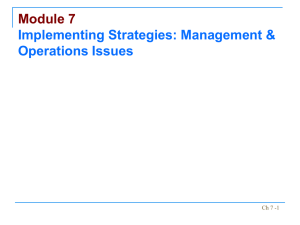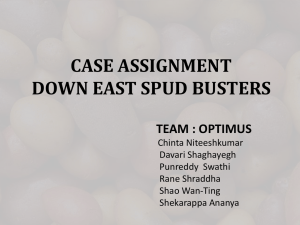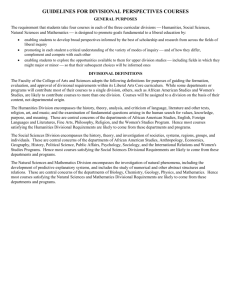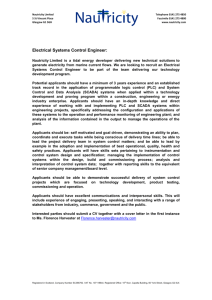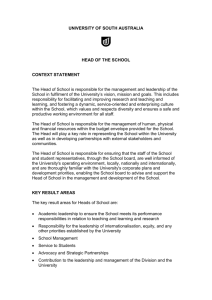PROCEDURES FOR THE CONFERMENT OF THE TITLE OF FULL
advertisement
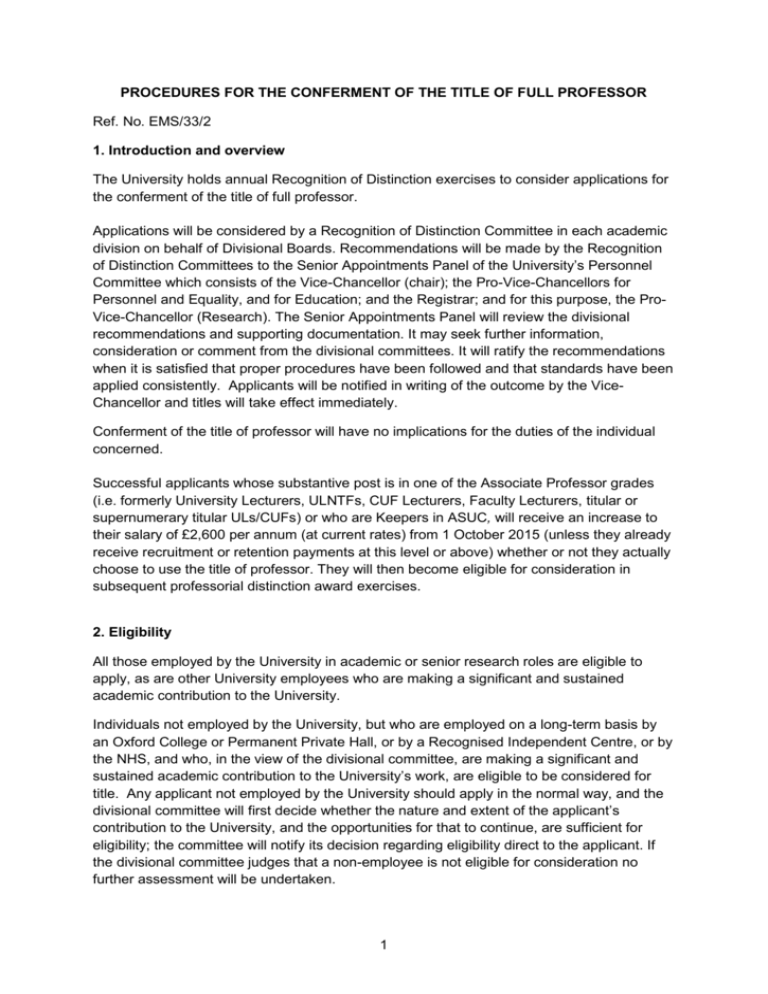
PROCEDURES FOR THE CONFERMENT OF THE TITLE OF FULL PROFESSOR Ref. No. EMS/33/2 1. Introduction and overview The University holds annual Recognition of Distinction exercises to consider applications for the conferment of the title of full professor. Applications will be considered by a Recognition of Distinction Committee in each academic division on behalf of Divisional Boards. Recommendations will be made by the Recognition of Distinction Committees to the Senior Appointments Panel of the University’s Personnel Committee which consists of the Vice-Chancellor (chair); the Pro-Vice-Chancellors for Personnel and Equality, and for Education; and the Registrar; and for this purpose, the ProVice-Chancellor (Research). The Senior Appointments Panel will review the divisional recommendations and supporting documentation. It may seek further information, consideration or comment from the divisional committees. It will ratify the recommendations when it is satisfied that proper procedures have been followed and that standards have been applied consistently. Applicants will be notified in writing of the outcome by the ViceChancellor and titles will take effect immediately. Conferment of the title of professor will have no implications for the duties of the individual concerned. Successful applicants whose substantive post is in one of the Associate Professor grades (i.e. formerly University Lecturers, ULNTFs, CUF Lecturers, Faculty Lecturers, titular or supernumerary titular ULs/CUFs) or who are Keepers in ASUC, will receive an increase to their salary of £2,600 per annum (at current rates) from 1 October 2015 (unless they already receive recruitment or retention payments at this level or above) whether or not they actually choose to use the title of professor. They will then become eligible for consideration in subsequent professorial distinction award exercises. 2. Eligibility All those employed by the University in academic or senior research roles are eligible to apply, as are other University employees who are making a significant and sustained academic contribution to the University. Individuals not employed by the University, but who are employed on a long-term basis by an Oxford College or Permanent Private Hall, or by a Recognised Independent Centre, or by the NHS, and who, in the view of the divisional committee, are making a significant and sustained academic contribution to the University’s work, are eligible to be considered for title. Any applicant not employed by the University should apply in the normal way, and the divisional committee will first decide whether the nature and extent of the applicant’s contribution to the University, and the opportunities for that to continue, are sufficient for eligibility; the committee will notify its decision regarding eligibility direct to the applicant. If the divisional committee judges that a non-employee is not eligible for consideration no further assessment will be undertaken. 1 Divisional Boards may confer the title of Visiting Professor on an individual who is not an Oxford University employee if it is considered that the individual more appropriately fits that category and is of appropriate distinction. Applications from individuals working in Continuing Education or in the Academic Services and University Collections, or from individuals who are not employed by the University, will be considered by the academic division in which the individual’s academic contribution is being made. Applications from individuals whose work is interdisciplinary and spans more than one division, or who hold contracts in more than one division, will be considered by the division which the applicant considers to be most relevant. Divisions will confer as necessary about such applications, and should indicate in their report to the Senior Appointments Panel that they have done so. 3. Criteria for Conferment of the Title of Full Professor There are three criteria for the conferment of the title of full professor: research, teaching, and good citizenship. All three criteria must be met. In this exercise there are no circumstances in which narrowly undershooting any one of these criteria can be compensated by exceptional achievements in respect of the other criteria. The criteria are set out below: Research An ongoing research record which is characterised by a significant influence on the field of study, and is of a high order of excellence and of international standing, and the quality of which in terms of research distinction is at least equal to that expected of those appointed to full professorships at other leading international research universities. ‘Research’ is to be understood as original investigation undertaken in order to gain knowledge and understanding, including work of direct relevance to the needs of commerce and industry, as well as to the public and voluntary sectors; scholarship; the invention and generation of ideas, images, performances, and artefacts, including design, where these lead to new or substantially improved insights; and the use of existing knowledge in experimental development to produce new or substantially improved materials, devices, products, and processes, including design and construction. Research must be published and available for inspection. This requirement goes significantly beyond the level of research achievement necessary for reappointment to the retiring age in an associate professorship at Oxford. The University will be looking for evidence of an appropriate combination of some or all of the following activities and outputs, considered in the context of excellence in the discipline: research outputs or scholarship recognised in terms of originality, innovation, significance and rigour; 2 academic leadership in shaping the future of the discipline (which may include the establishment of successful research groups and/or significant engagement with major collaborations); an effective contribution to the research culture of the department/faculty at Oxford, e.g. through the supervision and mentoring of the next generation of researchers; a proven record of successful DPhil supervision; a record of securing external research funding, from relevant sources, where appropriate; influence of the research activity beyond academia, including engagement with technology transfer and/or technical developments and/or knowledge exchange including patents, where appropriate; recognition of the excellence of research, for example through election to learned societies and research bodies/invitations to deliver prestigious lectures/appointment to editorial boards of leading journals. Not all of these seven points have to be met (and this is not an exhaustive list of possible research achievements). However, strong performance across several aspects is expected for the conferment of the title of full professor, and the title is not likely to be conferred on applicants with achievements in just a few of the above areas, nor in the absence of research outputs or scholarship recognised in terms of originality, significance and rigour. Teaching An ongoing record of effective teaching for the University and for colleges concomitant with the duties of the university post and the college fellowship (where one is held). ‘Teaching’ covers either undergraduate or graduate teaching, or both. Good citizenship An ongoing record of involvement in University and/or college administration concomitant with the duties of the university post and the college fellowship (where one is held), and demonstrable competence in such administration. “Good citizenship” may include activities such as the holding of university and/or college offices, service on university and/or college committees, amongst others. Account may also be taken of editorship of journals, service on committees working in a national context, and other forms of public engagement, as well as activities connected to enterprise, links with industry and business etc. 4. Applications and References A Call for Applications will be published every Michaelmas Term. Applications should be made following the guidance in the Call for Applications for the relevant year of application. Two sets of references will be required for each application: 3 1. References sought by applicants from: The head of department or the faculty board chair (or head of division if the applicant is a head of department or faculty board chair), who may however delegate the writing of the reference. In respect of those who are working in Continuing Education, or the Academic Services and University Collections, there should also be a reference from the head of the department/chair of the faculty board with which their academic work is most closely associated. One research referee, of their own choice, who may be either internal to Oxford or external. The research referee may also address the teaching and/or good citizenship criteria if he or she wishes to do so. The head of house (who may however delegate the writing of the reference) in all cases where applicants have a college attachment which carries the expectation that they will undertake some teaching and/or good citizenship (e.g. acting as college advisor to a group of graduate students). However, if an applicant has a college association which amounts to no more than, say, occasional SCR dining rights, there is no need for the head of house to provide a reference. The principal function of the references from the head of department or faculty board chair and the head of house is to give an assessment of the individual’s contributions against the criteria for teaching and “good citizenship”. These referees may also address the research criterion if they wish. Where an applicant does not have a college attachment the assessment of the teaching and “good citizenship” criteria will rely on the reference from the head of department or faculty board chair. 2. Independent assessors nominated by academic divisions In addition to the references arranged by applicants as outlined above, divisional Recognition of Distinction committees will seek at least two additional independent evaluations for each applicant which focus on the extent to which applicants meet the research criterion. Assessors should preferably be external to Oxford, and from outside the UK if possible, so as to be in a strong position to comment on the international visibility of the applicants. The combination of research reference and independent evaluations should be sufficient to give the clearest evidence as to whether the research criterion has been met, noting that that criterion requires a research record at least equal in distinction to that expected of those appointed to full professorships at other leading international research universities. The independent assessors may also address the teaching and/or the good citizenship criteria if they wish to do so. The divisional committees may seek supplementary information, as they see necessary, in order to reach fair and consistent recommendations. Where it has not proved possible for a division to obtain at least two additional independent evaluations within the timescale of the exercise, consideration of the application will be suspended by the divisional committee. 4 5. Timetable of Actions for the Recognition of Distinction exercise The following timetable should be read by applicants in conjunction with the Call for Applications published each Michaelmas Term. 5.1 Action by applicants a) Michaelmas Term i) Discuss candidacy with head of department/faculty board chair or other senior colleagues as appropriate, and attend a divisional briefing session if offered. ii) Prepare application and any disclosure of personal circumstances as explained in the Call for Applications and arrange for referees (head of department/faculty board chair, head of house if relevant, and one research referee) to send references to the division by the closing date. iii) Submit application by the closing date following the instructions in the Call for Applications. b) Long Vacation i) Receive notification of outcome from the Vice-Chancellor. Titles for successful applicants will take effect immediately the decision is notified. ii) Contact head of division to arrange feedback if unsuccessful. 5.2 Action by divisions a) Michaelmas Term i) Set up Divisional Recognition of Distinction Committees and arrange dates. Divisional Committees, normally chaired by the head of division, should be broadly based, covering as far as possible the major disciplines or broad areas of study under the aegis of the particular board, and must have significant external membership. Distinguished emeriti who have had broad involvement outside Oxford may be included to a limited extent as ‘externals’ but should not form a major element of external representation. The internal members of the divisional committees should comprise only statutory or ad personam professors, those holding the title of professor, and heads of department/chairmen of faculty boards. ii) Publish the composition of the divisional Recognition of Distinction committee on the divisional website and pass a list of members to Personnel Services for publication in the Gazette. iii) Publicise the forthcoming exercise to all those divisional staff eligible to apply. This includes drawing the attention of all eligible candidates to the current Call for Applications to, making available the composition of the divisional committee, and publicising any divisional briefing sessions. In publicising the exercise the division will draw attention to any groups under-represented at full professorial level in that division, emphasising that it would especially welcome applications from those groups. 5 b) Hilary Term i) Receive applications and references requested by applicants by the published closing date. ii) Divisional committees must consult between themselves in cases where an individual falls for consideration to more than one board. Particularly careful consideration (especially in relation to the seeking of independent research evaluations) should be given to applicants whose work is interdisciplinary. iii) Divisional committees meet for the first time to: Assess applications from individuals not employed by the university as to their eligibility for consideration and inform them of the outcome. Those judged ineligible will not be considered further. Agree the names of independent research assessors for each applicant Plan consultation with divisional committees in other academic divisions. where an individual’s research spans more than one division. Particularly careful consideration (especially in relation to the seeking of independent assessors) should be given to applicants whose work is interdisciplinary. In the case of applications based in ASUC, plan for the divisional committee to obtain appropriate input from ASUC. External committee members should be invited to the initial meeting to decide on independent assessors and the eligibility of applicants who are not employees, but do not necessarily have to attend initial meetings provided that they are fully consulted (i.e. invited to send in views beforehand and to comment afterwards on the decisions before any action is taken). c) Trinity Term i) Divisional committees meet for the second time to review applications and agree their recommendations to the Senior Appointments Panel. External committee members must be present at this meeting. Each application must be assessed strictly by reference to the criteria in section 3 above, taking into account any disclosures of personal circumstances submitted by applicants, and comments from other divisions on interdisciplinary applicants. The divisional committee may seek supplementary information, as it sees necessary, in order to reach fair and consistent recommendations. ii) Divisional committees forward recommendations to the Senior Appointments Panel including a note of any statistical or other anomalies of which the committee was aware, and any explanation for such anomalies, and for each applicant: A summary of the committee’s evaluation against the criteria. A recommendation as to whether the title of full professor should be conferred or not. Where the recommendation is to confer the title, and the applicant has not indicated that he or she wishes not to use the title, the committee should recommend the title they consider appropriate. A note of whether personal circumstances were disclosed and taken into account. For interdisciplinary applicants, a note on whether other divisions were consulted. 6 All documentation considered by the divisional committee including the application, any disclosure of personal circumstances and all references/evaluations. Where insufficient independent evaluations were received, a note to this effect. d) Long Vacation i) If requested by the Senior Appointments Panel, provide any further information or comment. ii) Inform any applicants for whom fewer than 2 independent evaluations were received that it was not possible to consider their application. iii) Inform departments/faculties of the outcomes. iv) Arrange for feedback to be given to unsuccessful applicants who request it by the head of division (or the chair of the divisional committee if the committee was not chaired by the head of division). v) Arrange payments to take effect from 1 October for those successful applicants who are eligible for additional payments (those in the Associate Professor and ASUC Keeper grades who are awarded the title, unless they already receive recruitment or retention payments at this level or above). vi) A list of successful applicants may be published on divisional and/or departmental websites once the outcomes for all candidates in the division/department are known. 5.3 Action by the Senior Appointments Panel a) Hilary Term The heads of division, the Vice-Chancellor and the Pro-Vice-Chancellor (Personnel and Equality) meet before the divisional committees convene each year in order to discuss overarching issues, including the treatment of such personal circumstances as are disclosed, and to foster a consistent approach. b) Late Trinity Term/Long Vacation i) Meet to review the documentation provided by each divisional committee and demographics of applications and success rates across the university to ensure proper procedure and consistent application of standards across divisions. ii) Either ratify the recommendations, or iii) Seek further information, consideration or comment from the divisional committees and ratify the recommendations when it is satisfied that proper procedures have been followed and that standards have been applied consistently. iv) Individuals will be notified of the outcome of their application by the Vice-Chancellor during the Long Vacation. 7 5.4. Other action after the conclusion of the exercise i) The Senior Appointments Panel will review the exercise with the heads of division, and agree any adjustments for subsequent exercises. ii) A list of those on whom the title of full professor has been conferred will be published in the Gazette at the start of the following Michaelmas Term. (It is important that departments and colleges do not publish details of successful applicants on their websites until the outcomes for all their candidates are known.) iii) A report on the outcome of the exercise will be submitted to the Personnel Committee for consideration, including an analysis of patterns of application and success by gender, ethnicity, etc. If significant evidence emerges that suitably qualified academics are not applying under these arrangements, the Personnel Committee will make proposals to Council to try to address this. 6. Unsuccessful Applications Feedback will be available from the head of division (or the committee chair if the committee was not chaired by the head of division) in cases in which it is agreed not to confer the title of full professor. Departments and faculties should ensure that appropriate mentoring arrangements are put in place for applicants who are not awarded title. Particular consideration should be given to arrangements for mentoring individuals who have applied unsuccessfully on more than one occasion and for those who work overseas. Mentoring should assist potential applicants to understand the application process for the recognition of distinction, and the criteria and standards that a successful application would need to satisfy. Unsuccessful applicants may reapply for title in subsequent exercises. However, applicants are advised that success in subsequent exercises will require additional evidence against the criteria, taking into account the feedback from previous applications. While an important publication (or the equivalent) may provide significance evidence within one year of an unsuccessful application, it is expected that the accumulation of evidence may take two or more years. Applicants are advised to discuss the timing of any re-application with the relevant head of department or faculty board chair. 8
